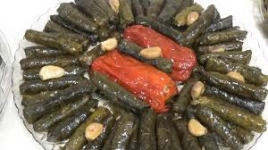Boston Community Hosts First Ever “Dolma Fest”
Wednesday, March 6, 2019
Hungry Armenians in the Greater Boston area spent the Sunday afternoon before Great Lent feasting and voting on the best homemade dolma in town.
Presented by Amaras Art Alliance, the first ever “Dolma Fest” featured the treasured, multi-generational recipes of nine Armenian women dishing it out in a friendly contest at Belmont’s Holy Cross Armenian Catholic Church.
In Armenian and Middle Eastern cuisines, dolma refers to a popular appetizer made of grape leaves packed with rice, ground meat and spices; it’s then wrapped and rolled into the shape of cigarettes or cigars, depending on preference. In Lebanese-Armenian or Syrian-Armenian families of the Diaspora, it’s known as sarma; the meatless version is called yalanchi. Even the Greeks have their variation of stuffed grape leaves—dolmakadia.
Dolma’s ingredients are definitely not ideal for the Lenten diet of the Armenian Apostolic Church, which instructs the faithful to abstain from animal products and oils for a period of 40 days through Palm Sunday to symbolize, as St. Stephen’s Armenian Apostolic Church described, “how empty life would be without God.” During this prayerful time of humility and reflection, there is a palpable separation from hearty food, holy communion, the kiss of peace during badarak and the grand sight of the church altar, which remains closed until Palm Sunday.
That is why Amaras Art Alliance organizers decided to host the all-you-can-eat celebration on Poon Paregentan (“Good living”), because as organizer and volunteer Maral Der Torossian exclaimed, “Tomorrow, there is no food!”
The table was full of numbered dolmas prepared by Marine Kavlakian, Arsho Aljukian, Alita Amaryan, Elizabeth Akhpalarian, Liana Arustamyan, Lena Altounian, Armenuhi Mkrtchyan, Parkoohi Voskanian and Jemma Hartenyan. There was also traditional harissa prepared by Natalya Zakaryan. The tantalizing sight was almost magnetic for the hungry masses, whose convergence was like a confused melee. Eventually, people started strategically arranging the dolmas on their plates so that they could remember which dolma belonged to which entry once they returned to their seats. Garo Yavshaoglu numbered his dinner plate like a clock, while other impatient guests indulged in a piece or two on the spot.
Diners quickly realized not all dolmas are equal, and that there are noticeable differences depending on the kitchen it came from. Some of these women eyeballed spices with a heavier hand, while others, like Arsho Aljukian, grew their own grape leaves. For Moscow native Artyom Djanikian and fan of dolma number eight, it was all about what reminded him of home. “As a rule, things that taste like my grandmother [from Armenia] has cooked them are the best.”
Amaras Art Alliance member Tatoul Badalian, who also loves dolma and grew up in Iran, said food serves as a critical layer in Armenian culture because “it has to do with survival.” “You eat, and you feel like you are going to make it to tomorrow. It’s not just today. You’ll be alright tomorrow too,” said Badalian recalling his father.
Lena Altounian was also nostalgic. “This is my mother’s and my grandmother’s recipe,” she said in Armenian of her entry—dolma number six. “[It] has been handed down, and we prepare it the same exact way with love and flavor. I hope it’s delicious.”
In the end, voters chose Alita Amaryan’s recipe for a second place prize of $100. Marine Kavlakian, who told the Weekly she learned how to wrap dolma when she was 15 years old by watching her grandmother and mother in the kitchen, won the $200 top prize. Kavlakian donated her winnings back to Amaras Art Alliance, whose mission is to organize cultural and performing arts programs that center on the heritage of the Armenian people.
To help everyone digest their meals, the group arranged for formal Armenian dance lessons by Allen Babroudi. Then local musicians Mher Mnatsakanyan, Markos Shahbazyan and Zori Babroudi performed traditional Armenian instrumental music with the duduk and the dhol.
Organizers told the Weekly they hope this event can become an annual tradition with contests centered around different Armenian recipes.





